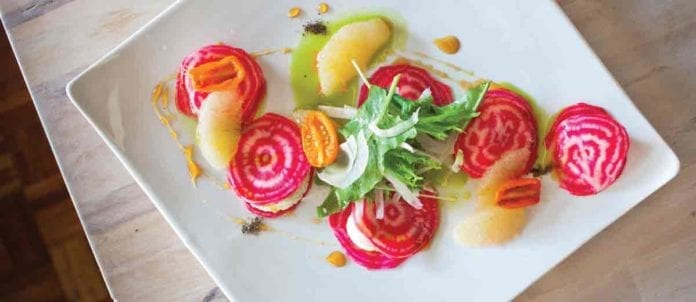It’s official: nose-to-tail cooking is passé. You might be wondering where things could possibly go from there — how does one top such charcuterie and “nasty-bits”-driven, meat-heavy, over-the-top cuisine?
The current rhetoric seems to be, you don’t. There’s been a steady decline in Canadians’ meat consumption over the past several years, opening the door for vegetarian ethnic cuisines, vegan restaurants, raw-food cafés and an increase in healthier options on some of the country’s most beloved quick-service and fast-casual restaurant menus. For example, Swiss Chalet’s “Healthier-Alternatives” menu — featuring vegetable-based sides with a skin-free quarter-chicken meal ($12.79) and larger main-course salads, such as Spinach Chicken Salad with fat-free raspberry vinaigrette ($13.99) — allows diners to mix and match sides and exclude unhealthy components of existing menu options. In addition, many menus across the restaurant spectrum now provide caloric information for all listed meals.
Why the shift in consumers’ eating habits? The environment is an important factor as scientists tell us the way we eat has to change if we want to reverse the effects of global warming. Many Canadians are concerned about the sustainability of meat-based food products and increased awareness of over-fishing, animal welfare and the use of genetically modified ingredients have made many wary of ready-made, frozen or mass-produced food products.
Personal health is also a growing concern — we now know a poor diet can lead to an increased risk for certain cancers, diabetes and heart disease. Sugar and sodium levels have been dangerously high in Canadian diets over the past several decades and, now, consumers are taking a closer look at what goes into their food.
Over the past 10 years, it has become commonplace for chefs and restaurateurs to include vegetarian, vegan and/or gluten-free options on their menus. Now, with the opening of many all-day cafés and restaurants specializing solely in healthful cuisine, the trends are going a step further. Artisanal sourdough breads, smoothie bowls, single-origin coffee and fermented vegetables are quickly taking over from the meat-heavy-menus of yesteryear — and consumers not only feel good about the food choices they’re making, they’re enjoying the flavour profiles of the food itself.
In St. John’s, The Sprout Café has been a staple in the vegetarian community for 13 years. In 2015, changes made by new owners Elizabeth Mysyk and her chef-partner Greg Dunne (The Sprout is now known as Poyo and The Sprout Takeout), the café’s menu is now more accessible to vegans, vegetarians and omnivores alike. “Before, [The Sprout] was a sit-down-only restaurant, the price point was higher and there was no take-out option,” Mysyk explains. “We were running a late-night take-out vegetarian taco business (Poyo) and were doing really well — our food is made quickly and it’s tasty and filling, so we would get a lot of late-night bar crowds for tacos after the pubs closed. When we took over The Sprout, we couldn’t convince our Poyo customers to come in. They wanted food faster and they wanted to be able to tailor it to suit their needs.”
The duo changed some of The Sprout’s existing menu items, such as the popular Pad Thai ($13.48), and tried to make the menu more vegan-friendly “so even the things that aren’t meant to be vegan can be made vegan.”
Originally, The Sprout was considered a higher-end option in St. John’s and many diners frequented it because they had food allergies and considered it a safe place to eat. Mysyk and Dunne have transformed the space into something that caters to everyone — whether celiac, vegan or omnivorous. “Not many of our customers are actually vegetarian — a lot of them were willing to try our food because…what else were they going to do at 2 a.m.? There were very few other options when we first started,” says Mysyk.
PUSHING THE LIMITS
This is a recurring theme among plant-based establishments in Canada. The Acorn restaurant in Vancouver has been catering to a diverse crowd of diners — vegetarians, vegans and meat-lovers — since it opened in 2012. For owner Shira Blustein, The Acorn was born from the lack of quality vegetarian restaurants in the area. Once opened, the food and overall experience quickly caught the eyes of critics and, as a result, The Acorn was listed among EnRoute Magazine’s Best New Restaurants in 2013 — the first time a vegetarian restaurant has been featured on the list.
“It was never about ‘being vegetarian,’ it was about creating a restaurant that didn’t present as vegetarian. That was the goal. We just wanted beautiful food that happened to be plant-based — our target market is everybody,” says Blustein, whose hyper-seasonal menu attracts a very diverse crowed. “Since our chef (Brian Luptak) and sous chef (Devon Latte) have come on board, the way they’ve embraced seasonality and developed well-crafted ingredients while still running with our original concept has been next level — they push the limits each and every day.”
The most popular dish is the beer-battered Halloumi with potato-zucchini latkes, mushy peas and mint yogurt ($21). “Our food is tasty first and healthy second because of our ingredients,” she explains. “We always have vegan and gluten-free options. Our menu changes constantly because we’re always getting great new seasonal ingredients to work with.”
Following the success of The Acorn, Blustein opened a casual eatery in 2017 called The Arbor. The food is plant-based, but with take-out options (such as the southern-fried artichoke sandwich, $13) as well as tables for sit-down meals. “We’re making the grab-and-go equivalent to The Acorn, which has become more of a special-occasion spot. Every pickle, every piece of bread — everything is familiar, recognizable food made from scratch by us.”
In response to operator demand for healthy, ready-to-eat foods, Del Monte Fresh Produce has recently introduced a new range of spiralized vegetables (called Del Monte Vegetable Noodles) as an alternative to high-carbohydrate foods. Dionysios Christou, vice-president of Marketing at Del Monte Fresh Produce, believes as busy Canadian consumers adapt to a healthier lifestyle, sales in fresh produce and healthy, grab-and-go snacks will surge.
Meanwhile, ambient food businesses can take advantage of consumers’ growing concerns over genetically modified ingredients in their foods. Grain is a Vancouver-based company specializing in GMO-free, fully traceable legumes, wheat and grain products (including a line of freshly milled flours) and other pantry staples (starting from $8.95). A committed vegetarian and food lover, co-owner Shira McDermott started Grain with partner Janna Bishop in 2016. In addition to its commitment to flavour and freshness in its product line, Grain directly supports Canadian farmers. “The farms we work with are predominantly well-established, multi-generation family businesses. Canada is one of the world’s largest producers of chickpeas and lentils and one of the world’s largest exporters of wheat — meaning the best wheat generally gets exported elsewhere. Starting Grain, we felt Canadians deserved access to the best as opposed to Grade C or D dry-goods products.”
McDermott maintains the business could not have started at a better time. With healthfulness and sustainability at the forefront of many consumers’ minds, restaurants are making more menu items from scratch. Many now incorporate a sourdough program in their kitchens and even more are creating organic grain-based dishes for their menus. “Part of why the timing was right in starting Grain is the resurgence in people wanting to know where their food is coming from. They care about things like locality and traceability. We’re able to put a farmer’s face and farm location to each product we sell. Because we support Canadian farmers, people like to support us.”
A FRESH APPROACH
Toronto-based QSR chain Freshii took a chance when it wasn’t clear where the health-food trend was going. There weren’t many vegan-friendly restaurants when Freshii first opened its doors in 2005 with menu items such as the veggie-laden Tortilla Soup. Melissa Gallagher, VP of Marketing at Freshii says consumers want healthy, on-the-go options as well as a choice in what they’re eating. “Freshii serves fresh food designed to energize people on the go.”
Loch & Quay in downtown Toronto — a healthy, comfort food haven that opened in November 2017 — is the latest endeavour of chef Devan Rajkumar. “With Loch & Quay I offer world-inspired, fresh and delicious flavours for busy professionals trying to stay healthy and active. I don’t want to sacrifice flavour or even portion size with my own meals — and I know there are so many like me in downtown Toronto. We are health-conscious, but still want great menu options as well as unique dining experiences.”
With popular menu options such as the Poke Bowl ($17) and the Jerk Chicken Sandwich ($17), Loch & Quay has made a splash on the Toronto restaurant scene.
As restaurants continue creating diverse menu options to suit today’s health-focused Canadian diet, there are many mindful directions to take that can suit most existing business models — even those based on indulgent foods — allowing operators to maintain healthy product choices while incorporating large portion sizes and, most importantly, plenty of great flavour.
Written by Janine Kennedy


















